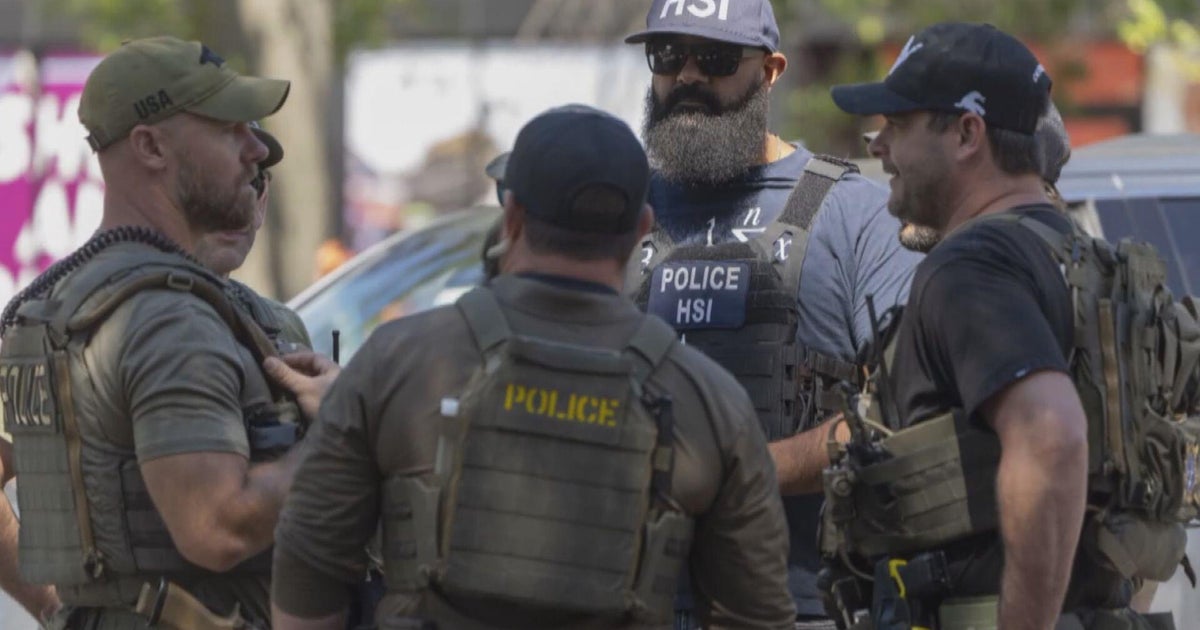
In a shocking turn of events, the Department of Homeland Security (DHS) confirmed on Saturday that a second attack targeting U.S. Immigration and Customs Enforcement (ICE) agents took place in the Chicago area.
The incident occurred amidst ongoing unrest, as the city has seen sustained anti-ICE riots for weeks. This latest attack, which involved a series of vehicles ramming and pinning down federal agents, further escalates the violence surrounding the federal immigration enforcement agency.
Tricia McLaughlin, a spokesperson for the DHS, confirmed that ICE agents were forced to return fire after coming under attack. The assault took place near a federal facility in Broadview, a community that has become a focal point of protest against ICE.
According to McLaughlin, the violence involved multiple rioters, at least one of whom was armed with a semiautomatic firearm.
The attack occurred on Saturday and involved multiple vehicles. Authorities allege that the vehicles were used to ram into an ICE vehicle driven by U.S. Customs and Border Protection (CBP) agents.
As the agents were pinned down by the vehicles, they were forced to defend themselves by returning fire. One of the attackers, later identified by prosecutors as Marimar Martinez, was injured by gunfire during the exchange and received medical treatment at a nearby hospital.
Martinez, along with co-defendant Anthony Ian Santos Ruiz, is facing charges related to the attack. Both individuals are accused of assaulting, impeding, and interfering with law enforcement officers, a serious offense under federal law.
The nature of the assault has raised concerns about the growing political violence in the region, with law enforcement officials pointing to this attack as another example of rising hostility toward federal immigration enforcement agents.
While the details of the attack were confirmed by federal officials, Illinois Governor JB Pritzker downplayed the seriousness of the incident during an interview on CNN on Sunday.
Pritzker, who has been a vocal critic of ICE’s policies, questioned the accuracy of the reports surrounding the attack and suggested that the facts were being manipulated.
“It’s really hard to know exactly what the facts are, and they won’t let us access the facts,” Pritzker said. “They are just putting out their propaganda, and then we’ve got to later determine what actually happened.”
His comments have sparked backlash from law enforcement officials and conservatives, who argue that the governor is downplaying an attack on federal agents and fueling the narrative of anti-ICE violence.
Pritzker’s remarks were seen as an attempt to minimize the severity of the situation, as the Chicago area has witnessed increasingly violent protests targeting ICE facilities and agents.
Critics of the governor argue that his response reflects a larger reluctance by some political leaders to acknowledge the growing danger posed by anti-ICE extremists.
On Sunday, footage began circulating on social media showing a vehicle ramming a pickup truck driven by federal agents. In the video, multiple vehicles can be seen blocking the path of the federal agents’ vehicle before one of the cars crashes further down the road.
The footage quickly gained attention online, adding to the public concern about the escalation of violence.

However, McLaughlin was quick to clarify that the footage circulating online was not from the incident involving Martinez and Ruiz. She posted on X (formerly Twitter), stating, “This footage is NOT from the attack in Chicago involving the 10-car caravan blockading our law enforcement, not involving ‘La Maggie.’”
The spokesperson explained that the footage was from a different vehicular assault that occurred later that same day, reinforcing the alarming trend of multiple attacks against federal agents.
“This is from ANOTHER vehicular assault later that day in Chicago where an individual rammed an ICE vehicle,” McLaughlin continued in her post. “This violence is rampant, as much as JB Pritzker wants to whitewash the facts on the ground.”
Her comments drew attention to the growing issue of anti-ICE violence in the region and the ongoing efforts by the federal government to respond to the mounting danger.
In light of the increasing violence and threats against ICE agents, DHS Secretary Kristi Noem announced that additional federal personnel would be deployed to the Chicago area to provide security and address the rising political violence.
On Saturday evening, Noem posted a statement on X, expressing her commitment to securing the safety of law enforcement officers.
“Today in Chicago, members of our brave law enforcement were attacked—rammed and boxed in by ten vehicles, including an attacker with a semi-automatic weapon,” Noem said.
“I am deploying more special operations to control the scene. Reinforcements are on their way.” Her statement underscores the urgency of the situation and the need for increased federal intervention to protect law enforcement officers in the area.

The deployment of additional federal personnel comes as part of a broader effort to combat the growing unrest in Chicago. Federal officials have repeatedly warned about the escalating political violence targeting ICE agents and other federal officers, with recent attacks highlighting the risks posed by anti-ICE extremists.
The federal government’s response is intended to bolster the security of federal facilities and law enforcement officers working in the region.
The attack on ICE agents in Chicago is just the latest example of the rising political violence surrounding immigration enforcement. In recent weeks, the city has been a hotspot for protests against ICE, with demonstrators clashing with law enforcement officers outside federal facilities.
These protests, while initially peaceful, have increasingly turned violent, with rioters using vehicles and firearms to target federal agents.
The violence has sparked a broader conversation about the role of ICE in American society and the growing divide over immigration policy. While some political leaders, particularly those on the left, have called for the abolition of ICE, others argue that the agency plays a crucial role in enforcing U.S. immigration laws and ensuring the safety of the nation.
The attacks on ICE agents reflect the deepening political polarization surrounding immigration enforcement and the broader debate over U.S. immigration policies.
The rise in anti-ICE violence has also raised concerns about the safety of federal agents and the ability of law enforcement to protect themselves and their families in an increasingly hostile environment.
With the violence intensifying, law enforcement officials have expressed alarm at the growing threats posed by extremist groups and individuals targeting federal agents.
This footage is NOT from the attack in Chicago involving the 10 car caravan blockading our law enforcement, not involving “La Maggie.”
— Tricia McLaughlin (@TriciaOhio) October 5, 2025
This is from ANOTHER vehicular assault later that day in Chicago where an individual rammed an @ICEGov vehicle.
This violence is rampant, as… https://t.co/j1WHwXDkVH
The attacks on ICE agents are not only a matter of federal concern but also have significant implications for the city of Chicago. The city, which has long been a center for immigration activism, is facing mounting tensions between law enforcement and activist groups.
The growing violence in the city threatens to further destabilize an already tense political and social environment.
Chicago has historically been a sanctuary city, offering protections to undocumented immigrants and resisting federal immigration enforcement efforts. However, the rise in anti-ICE violence has led to a reevaluation of the city’s stance on immigration and law enforcement.
As the violence escalates, there are growing concerns about the ability of local law enforcement to maintain order and protect both federal and local officers.
The city’s leadership, particularly Governor Pritzker, faces increasing pressure to address the violence and ensure that law enforcement agencies are equipped to handle the growing threat.
While Pritzker’s response has been criticized for downplaying the seriousness of the attacks, local residents and law enforcement officials are calling for a stronger stance against the rising violence.
The attack on ICE agents in Chicago marks a dangerous escalation in the ongoing political violence surrounding U.S. immigration enforcement. As anti-ICE protests continue to grow in intensity, federal agents are increasingly under threat from extremist groups and individuals determined to disrupt immigration enforcement efforts.
The recent attacks on federal agents underscore the urgency of addressing this rising violence and ensuring the safety of law enforcement officers.

While Governor Pritzker and other political leaders may attempt to downplay the severity of the situation, the reality is that the violence is escalating, and more must be done to protect those who enforce the nation’s immigration laws.
The deployment of additional federal personnel is a necessary step in securing the safety of law enforcement officers, but the broader issue of political violence must be addressed to prevent further attacks.
As the situation in Chicago continues to unfold, it is clear that the battle over immigration policy is far from over. The growing threat to federal agents serves as a stark reminder of the deep divisions in American society over immigration and the role of law enforcement in enforcing immigration laws.
The path forward will require a concerted effort from both federal and local leaders to protect the safety of law enforcement officers and restore order to the city.




